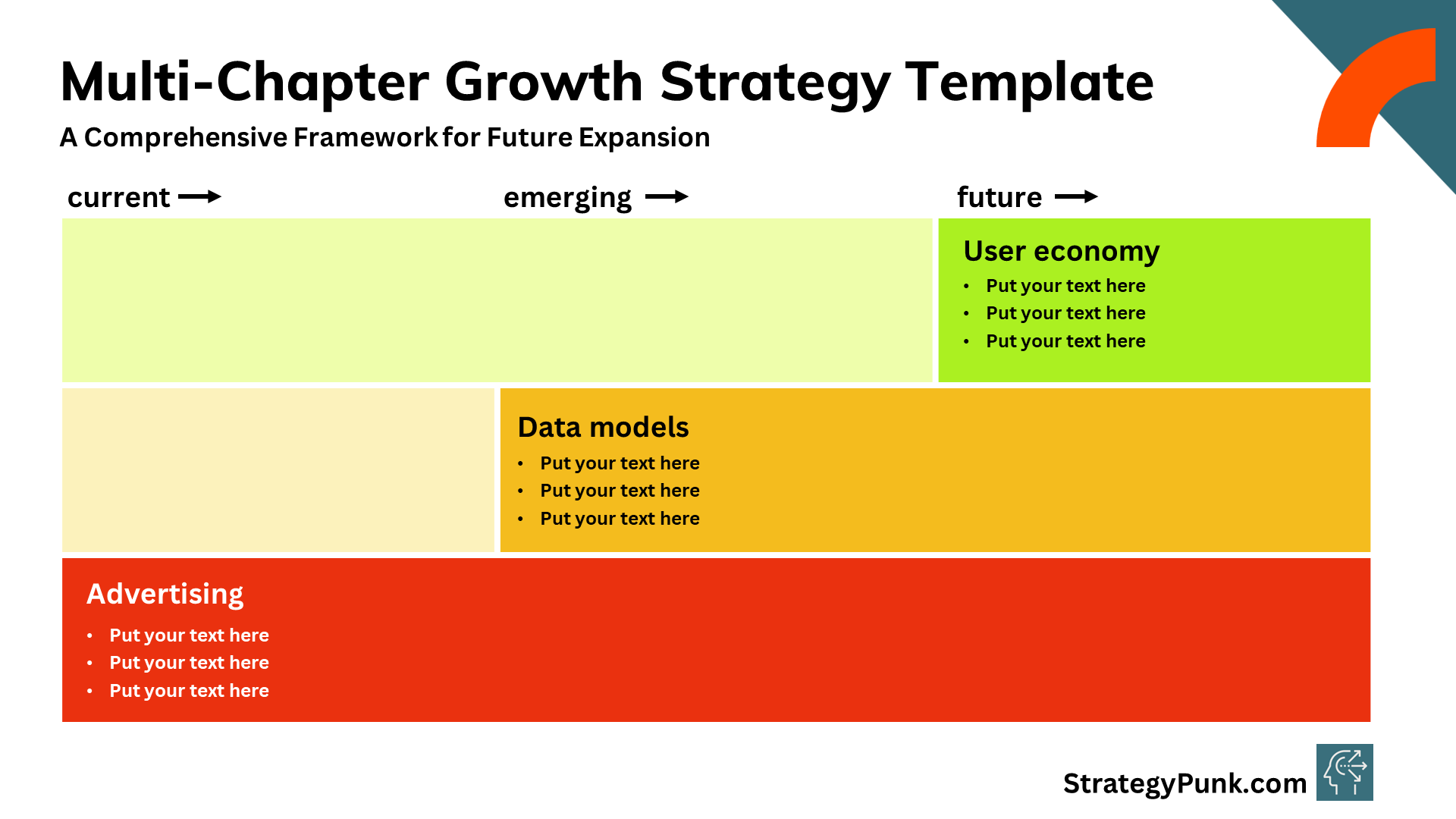Simplify Project Management in 6 Steps - Avoid Overcomplication
Simplify Project Management in 6 Steps: Stay focused & adaptable to avoid overplanning and set realistic goals. Learn key strategies for success.
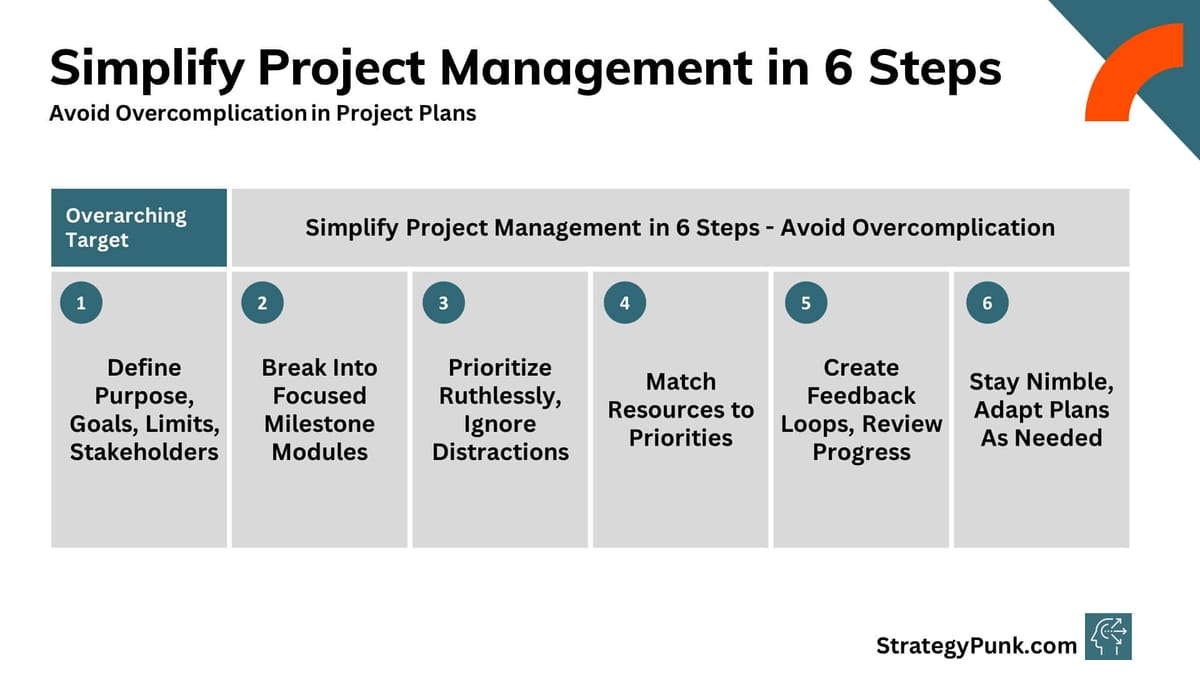
Introduction
Starting a new project can feel overwhelming. But Don't Overcomplicate Your Project Plans.
You might be tempted to try and plan for every possible outcome to avoid failure.
However, overplanning can slow you down and set unrealistic expectations. The key is keeping your project plans focused and adaptable.
Here are 6 Steps to Simplify Project Management
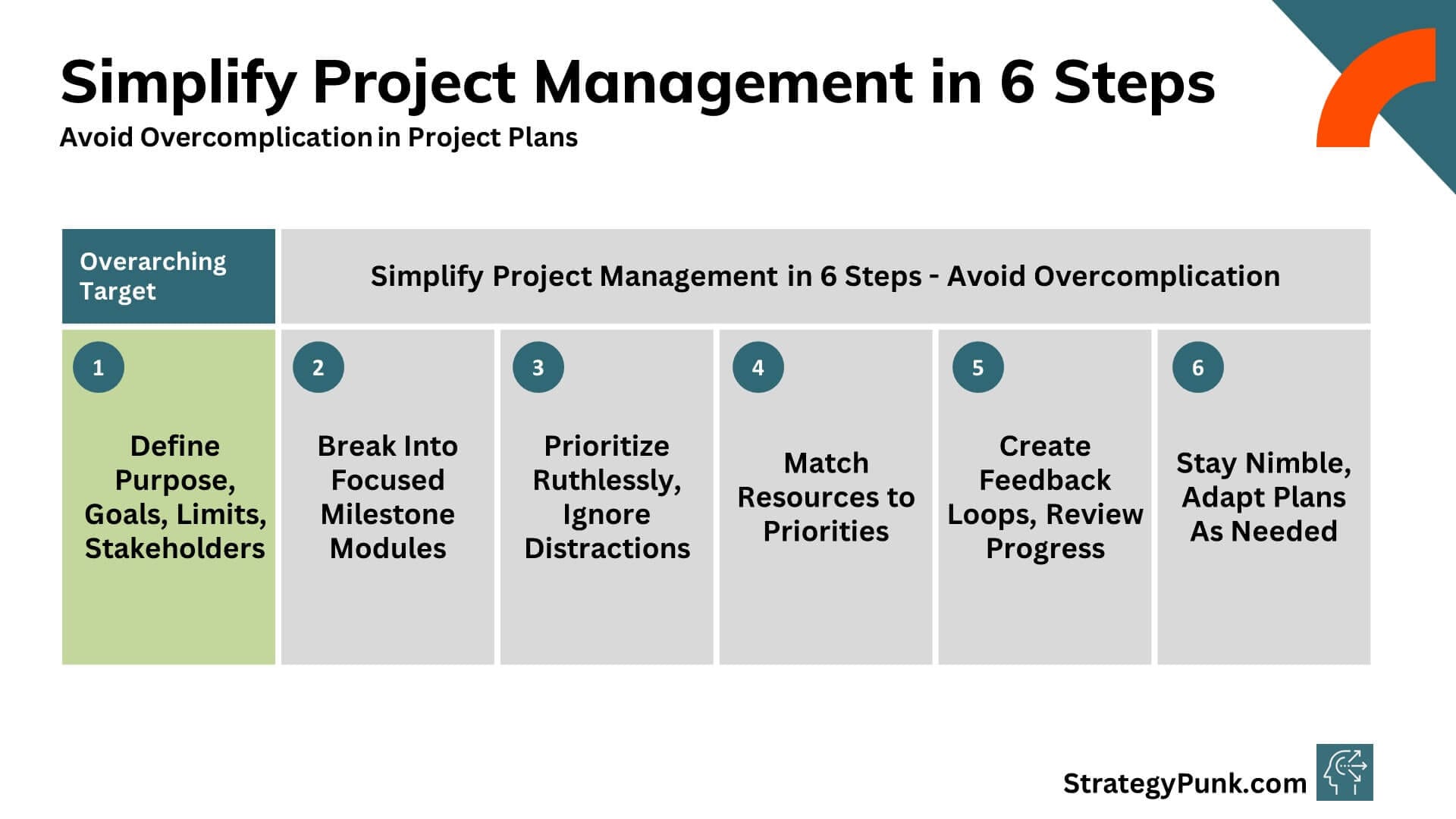
Define The Core Elements Of Your Project
Before diving into granular details, clearly define the core elements of your project:
Purpose: Why are you taking on this project? What specific goals will it achieve? Get alignment from key stakeholders on the intended outcomes.
Goals: Set 1-3 high-level, measurable goals aligning with the project's purpose. Goals should be realistic yet ambitious.
Constraints: Factor in limitations around budget, deadlines, resources, and technology/tools.
Stakeholders: Identify the key people, teams, and organizations impacted by or involved in your project. Understand their interests and needs. Taking time upfront to define these elements will provide crucial context for decision-making.
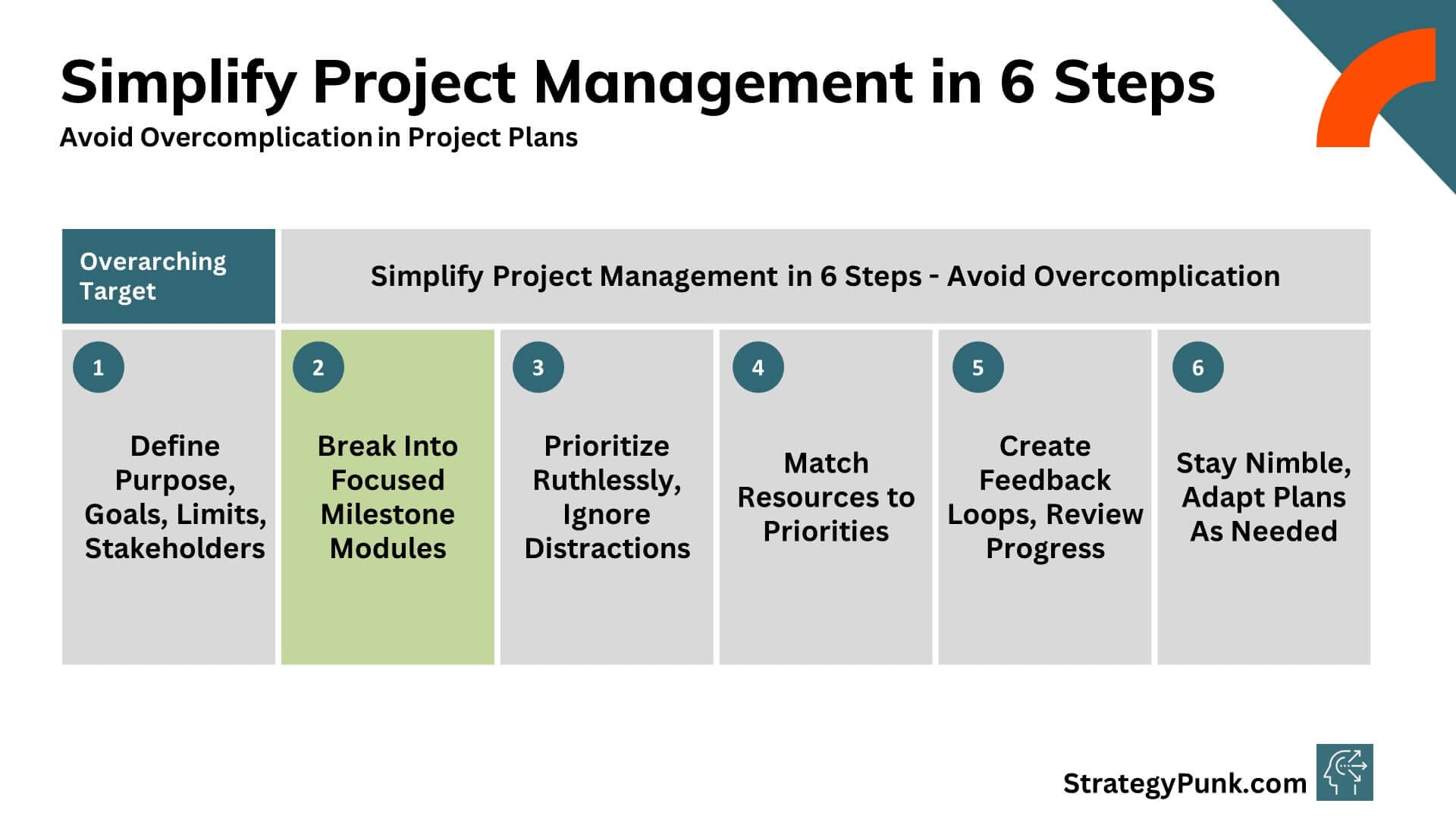
Create A Focused, Modular Plan
With your core elements framed, break down the work into modules or phases focused on achieving specific goals. Outline critical milestones, deliverables, and timeframes for each module.
This modular approach, centered around milestones, will help you:
- Work in targeted sprints
- Regularly evaluate progress
- Adapt plans over time
- Avoid rigid, complex plans
As new challenges or opportunities emerge, you can revisit modules and adjust specific activities as needed without derailing everything.
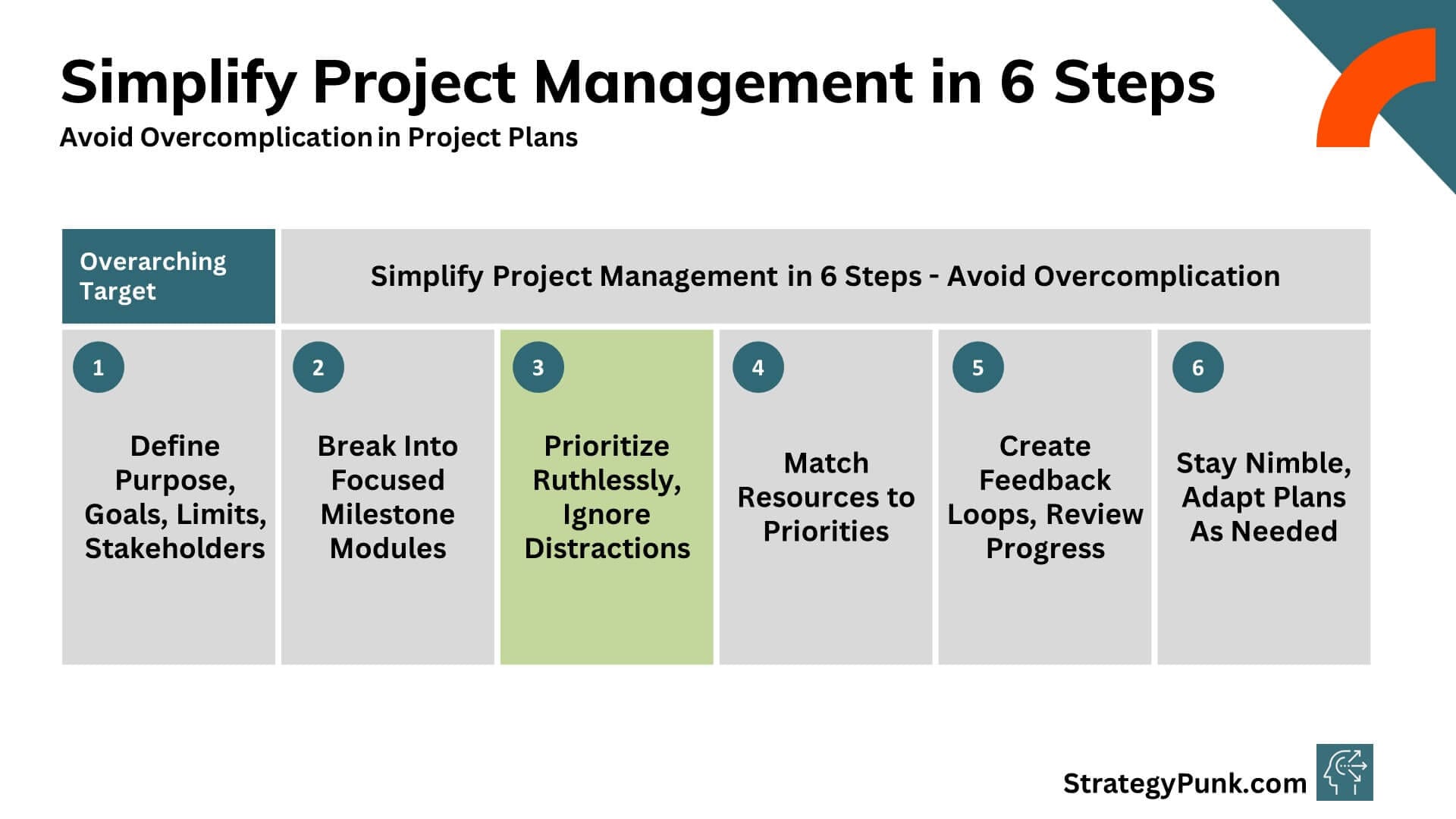
Prioritize Ruthlessly
Be highly selective about what makes it onto your project plan. Adding too many "nice-to-have" items will only create a distraction and make plans less achievable. Create a prioritized backlog and focus your initial plan on:
- Must-have features/activities to meet core goals
- Items that unblock other efforts
- Quick wins to build momentum
Visibly prioritizing your backlog allows you to allocate resources and maintain transparency with stakeholders about possibilities efficiently.
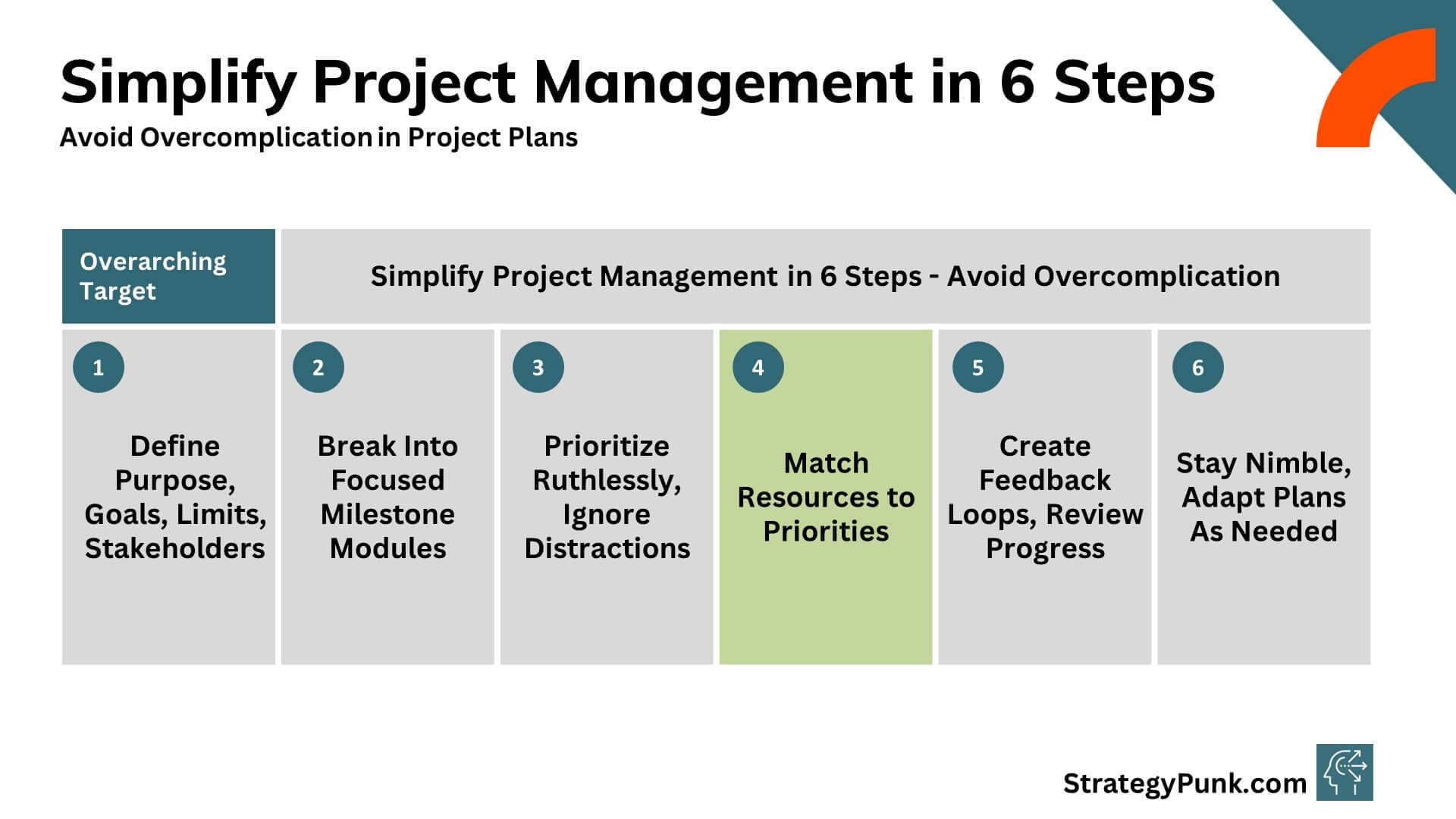
Align Resources To Priorities
Carefully assess your project's budget, staff, tools, and other assets. Align these resources directly to the priorities you outlined above. Say no to one-off distractions and vanity items that divert your focus.
Be strategic in allocating resources to maximize output. For example, consider which activities are better suited for tools vs. human effort. Identify gaps where you may need to augment budgets or teams.
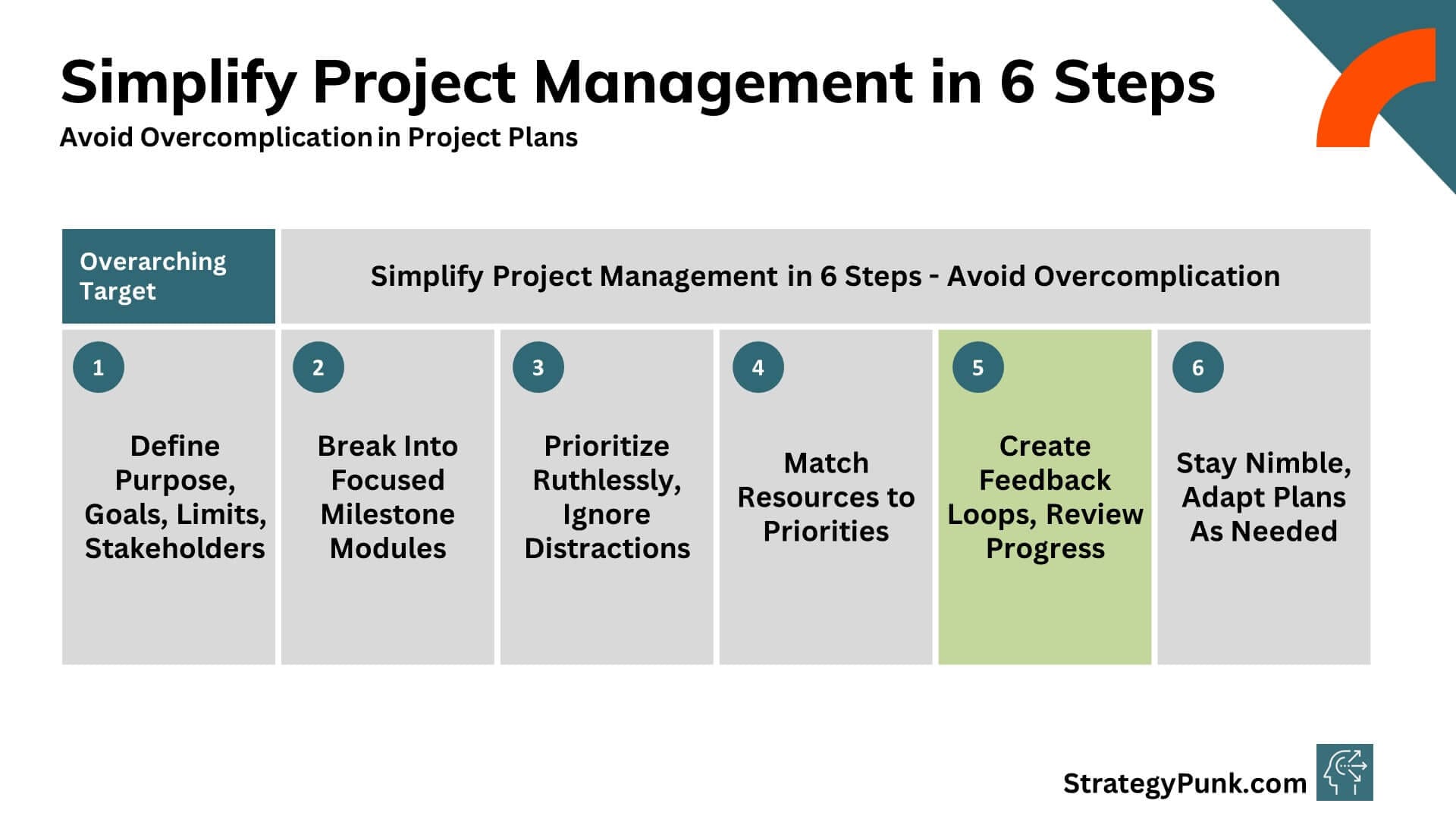
Create Feedback Loops
Incorporating regular feedback loops will help you continuously refine plans based on new learnings rather than overplanning everything on day one.
Build review points at the end of each module or milestone to objectively evaluate progress and collect input from stakeholders and team members.
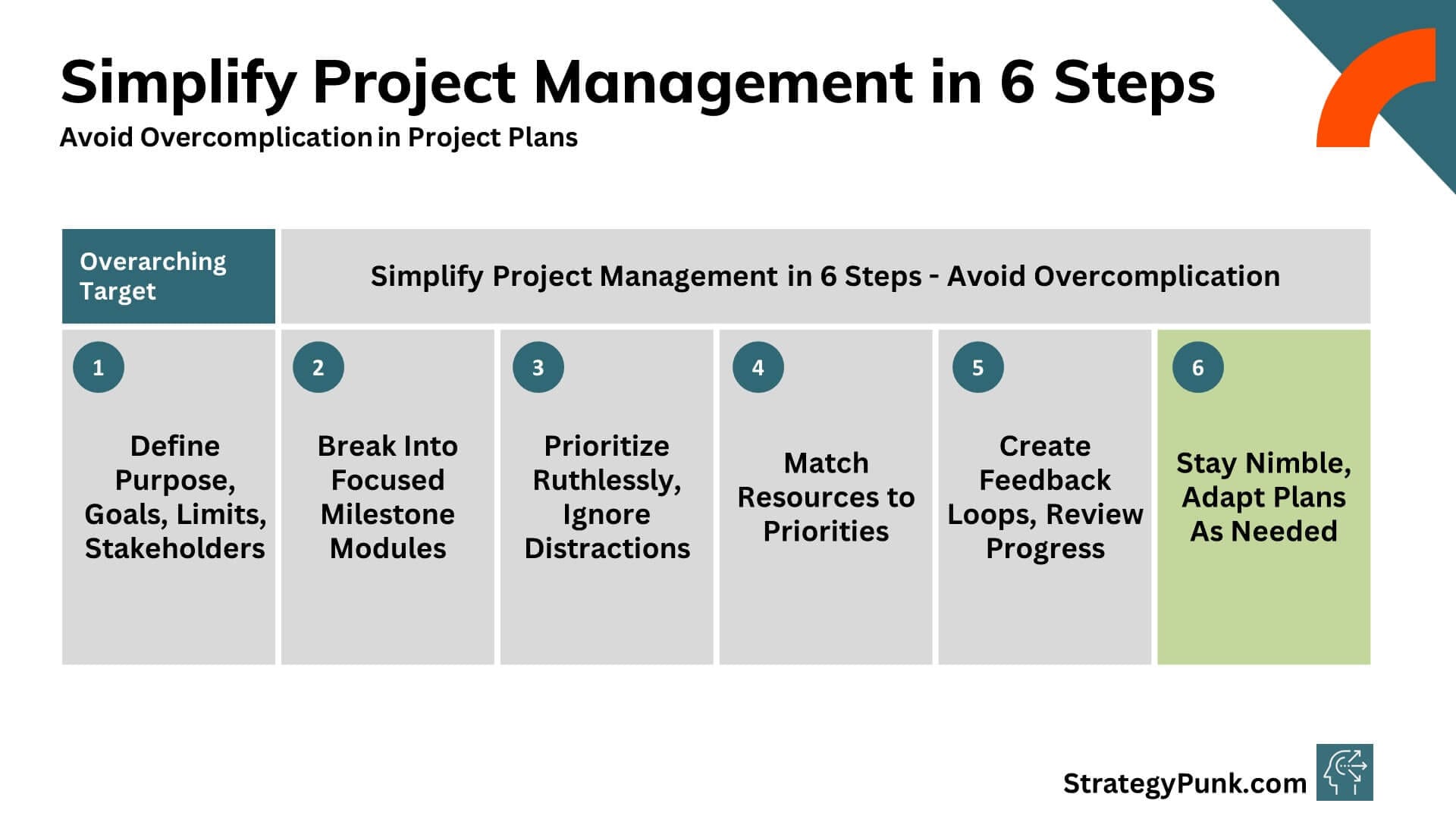
Stay Nimble, Adapt Plans As Needed
Use this feedback to determine your next step, which may mean tweaking your original plans. Maintain an agile mindset focused on outcomes rather than rigid plans or timelines.
Summary: 6 Steps to Simplify Project Management
Define Purpose, Goals, Limits, Stakeholders
Define the project purpose, goals, constraints, and stakeholders. Establish why you are taking on this project, what success looks like, what limitations to consider, and who needs to be involved/informed.
Break Into Focused Milestone Modules
Break the project into modules. Divide the work into focused phases to achieve specific milestones aligning with your goals.
Prioritize Ruthlessly, Ignore Distractions
Prioritize ruthlessly. Assess and categorize all potential activities/items based on impact and urgency. Focus your initial plan only on the must-have tasks.
Match Resources to Priorities
Align resources to priorities. Honestly evaluate your budget, staff, tools, and other assets. Allocate these finite resources directly to the prioritized activities from Step 3.
Create Feedback Loops, Review Progress
Create feedback loops. Build review points at milestones to collect input from stakeholders and teams. Use this feedback to refine plans as needed.
Stay Nimble, Adapt Plans As Needed
Stay nimble. Maintain flexibility in your plans so you can adjust to emerging challenges. Keep focused on outcomes rather than rigid timelines.
Conclusion
This simplified, modular framework should help readers approach project management in a more adaptable, less overwhelming way.
The key is focusing only on the most critical activities and staying agile to handle new learnings as they emerge rather than overplanning.
Avoiding analysis paralysis and overplanning is crucial to executing projects efficiently.
By focusing your plans on clear goals and priorities, embracing modular designs, and creating feedback loops, you can simplify project management in impactful ways.
Stay nimble and let your plans flex as challenges emerge.
Frequently Asked Questions
How can I avoid creating overly complex project plans?
Focus your initial plans on the most critical activities aligning directly with your core goals. Break the project into modular phases centered on milestones rather than trying to plan everything upfront. Maintain flexibility to adjust plans based on regular feedback loops.
What are some best practices for defining a new project?
Establish the purpose, measurable goals, budget/resource constraints, and key stakeholders early on. Get alignment from stakeholders on intended outcomes before detailed planning.
How should I prioritize activities within my project plan?
Be highly selective and ruthless. Categorize potential tasks and only focus your initial plans on must-have items that are crucial for objectives or unblock other work. Ignore non-essential “nice-to-haves.”
How can I stay nimble if challenges or changes emerge?
Build regular review points at milestones to re-evaluate priorities and plans based on new learnings. Focus more on adaptable timeboxes over rigid timelines. Have a change management process for updating stakeholders.
How can I simplify project communication and tools?
Carefully evaluate each tool and process for relevance and value before introducing it. Look for opportunities to standardize platforms across projects versus one-off niche solutions. Keep communication focused on critical updates rather than over-messaging.
What are the foundational questions to begin with in project management?
Start with the "Who?", "What?", "Where?", "When?", "Why?" and "How Much?" questions. These basic inquiries lay the groundwork for understanding project scope and requirements.
How should project managers evaluate the cost impact of risks when it's difficult to quantify?
When the exact cost impact is difficult to quantify, use qualitative estimates like Low, Medium, and High to evaluate the risk.
What is an effective way to handle conflicts in project teams?
Conflicts should be addressed early, usually privately, using a direct, collaborative approach. This method helps in resolving issues without disrupting the team's workflow.
What options can a project manager consider if a project requires more time due to added contingencies?
A project manager can consider overlapping some tasks, adjusting the contingency, or reevaluating resource allocation to maintain the schedule.
How does the "Timing" domain influence project management?
The "Timing" domain involves creating a schedule with critical milestones and end dates. It ensures the project adheres to a timeline, incorporating important intermediate dates for stakeholder focus.
Discover more
Effortless Success: Master Your Projects with Our Simple Project Plan Template
Master simplicity in project management for success! Enhance efficiency and adaptability with our free and simple project plan template.
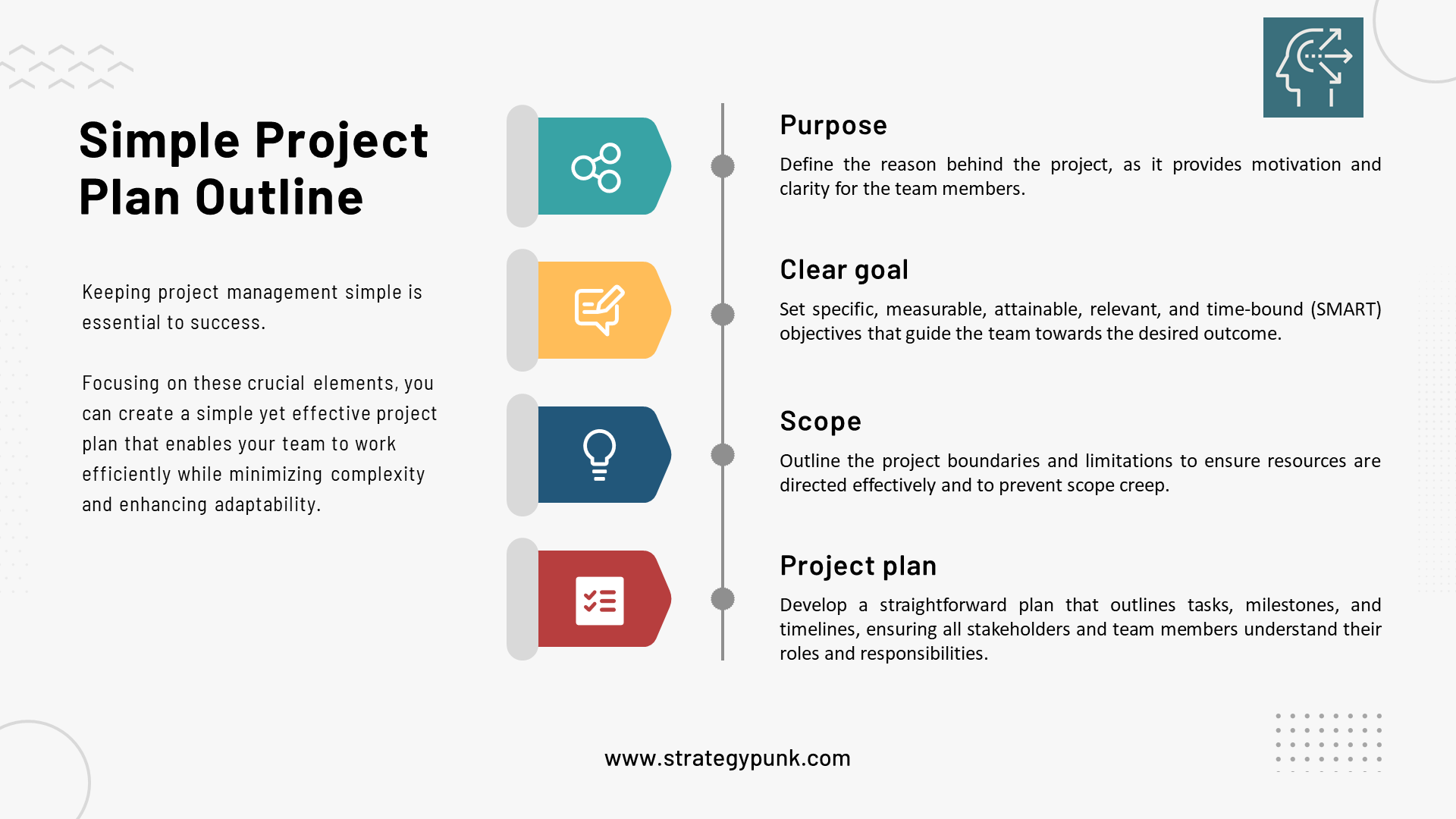
The Top 10 Reasons Why Projects Fail
This blog post is unveiling the top 10 reasons behind project failures. Dive into the everyday challenges, from vague goals and miscommunication to inadequate planning and unrealistic expectations, that derail projects.

Project Management Unlocked: The 11 Golden Rules for Stellar Outcomes in 2024
Explore the 11 Golden Rules for Project Management Success in 2024. Dive into expert strategies for goal alignment, effective team building, and risk management. Enhance your skills with our comprehensive guide and download a free PDF template to achieve stellar project outcomes.
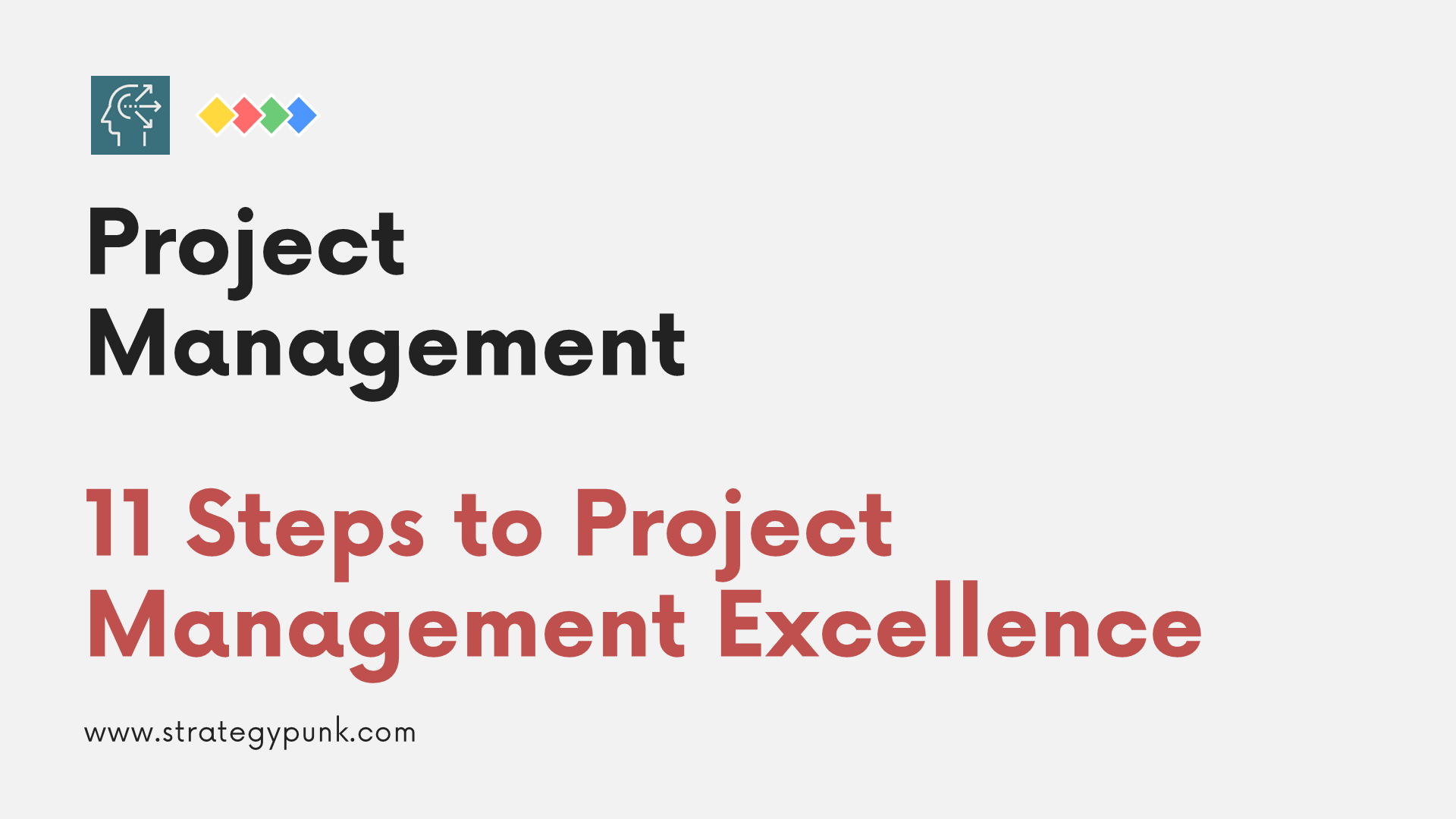
Project Plans: 7 Elements You Can't Ignore
Curious about the core components of a successful project plan? Dive into our guide to uncover the seven essential elements every project plan should include, setting the stage for unparalleled success.




